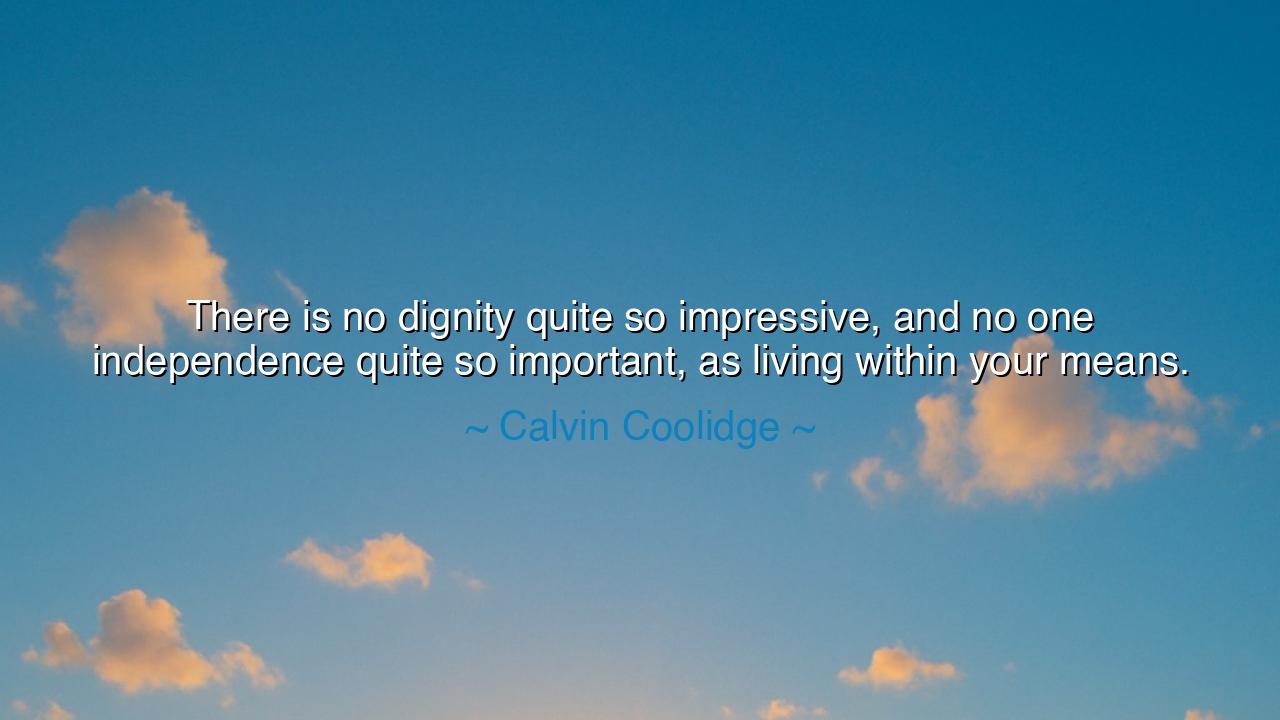
There is no dignity quite so impressive, and no one independence
There is no dignity quite so impressive, and no one independence quite so important, as living within your means.






Hear now the words of Calvin Coolidge, the quiet guardian of prudence and the philosopher of simplicity: “There is no dignity quite so impressive, and no one independence quite so important, as living within your means.” In this saying lies the still voice of wisdom that has guided every great civilization — the law that discipline is the root of freedom, and that true honor is not found in splendor or wealth, but in restraint. Coolidge, a man who led not through pomp but through principle, spoke these words as both a warning and a blessing: that in mastering one’s desires, a person gains mastery over life itself.
The origin of this quote comes from the mind of a president who governed America during a time of roaring abundance — the 1920s, an age of prosperity and extravagance. Yet even as cities glittered with lights and fortunes were made overnight, Calvin Coolidge saw the danger hidden beneath the surface: the illusion that wealth alone could secure happiness or strength. He understood, as the ancients did, that excess leads to weakness, and that the foundation of character, whether in a nation or an individual, lies in moderation. His words are not merely about money — they are about independence, the sacred power of standing upright without need or debt, of living freely by one’s own honest labor.
The ancients, too, spoke this truth in many tongues. The Stoic philosophers taught that the wise man desires only what he can rightly possess, and that contentment, not opulence, is the mark of greatness. Socrates, when asked why he was poor, replied, “Because I desire little.” In that simple answer lies the heart of Coolidge’s creed: to live within one’s means is to refuse enslavement — to the appetites, to vanity, or to others’ approval. The one who spends beyond his strength sells his freedom for comfort, his dignity for display. But the one who governs his desires, even in scarcity, walks as a king among men.
Consider the story of George Washington, who, though wealthy in estate, practiced a life of simplicity and frugality. As a young man, he learned from hardship that extravagance was the enemy of independence. When he led the armies of the Revolution, his greatness lay not in riches but in self-restraint — he refused a crown, he took no pay beyond what was due, and he served the republic not for gain, but for principle. When at last he retired to Mount Vernon, he lived humbly, a master not of others, but of himself. Washington embodied the truth Coolidge would later speak: dignity is not bought; it is earned by living honorably and wisely within one’s means.
Coolidge’s teaching carries both humility and fire. It is a rebuke to the age of greed and a reminder that true independence is not achieved through accumulation, but through self-control. The man who must always borrow, who must always possess more, is never free — for he is bound by his desires as surely as by chains. To “live within your means” is to say, “I have enough.” And in that quiet affirmation, a great peace is born — the peace of knowing that nothing external can enslave what is inwardly whole. It is the same peace that guided the philosophers of old, the saints of the spirit, and the builders of nations who sought not luxury, but virtue.
There is also dignity in this discipline — a noble pride that rises from honest stewardship. Coolidge’s words remind us that thrift is not meanness, but reverence: reverence for one’s labor, one’s limits, and one’s responsibilities. A family that lives within its means stands on solid ground, unshaken by storm or fortune. A nation that does so commands respect and endures. And a soul that lives thus — sober, grateful, and unpretending — carries itself with quiet majesty. This is the impressive dignity of which Coolidge spoke: not the splendor of riches, but the serenity of balance.
O listener, take this wisdom as a lamp for your path. Do not measure your worth by possessions, but by your peace of mind. Spend not to impress, but to sustain. Work diligently, save prudently, and let your desires be guided by purpose, not vanity. The one who lives within his means walks freely, owing nothing to pride or debt. And in that freedom lies the essence of independence — the kind no ruler can grant and no market can sell.
Thus, let the teaching of Calvin Coolidge endure as a pillar of wisdom in an age of excess: to live within one’s means is the highest form of strength, the truest mark of virtue, and the purest expression of freedom. The man who masters his wants becomes master of his life; the woman who lives within her means holds in her hands the crown of self-respect. For in the end, all greatness begins with this humble truth — that dignity and independence belong not to those who have the most, but to those who need the least.






AAdministratorAdministrator
Welcome, honored guests. Please leave a comment, we will respond soon